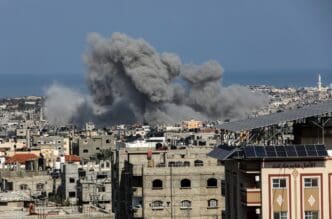Executive Summary
The Story So Far
Why This Matters
Who Thinks What?
The European Union is perceived as having abdicated its role as a significant geopolitical actor, particularly concerning the conflict in Gaza, despite its economic influence and geographical proximity to the Middle East. The article suggests that Europe, including Italy, is instead adopting a moralistic stance, relying on the “two peoples, two states” mantra while failing to exert meaningful pressure or develop a cohesive strategy, leading to a perception of political paralysis and irrelevance on the global stage.
EU’s Perceived Geopolitical Abdication
Despite being Israel’s largest trading partner and the primary financier of the Palestinian cause, the European Union is described as failing to leverage its economic power to influence the conflict. Internal divisions among member states, ranging from pro-Israeli to pro-Palestinian positions, are cited as contributing to Brussels’ reliance on communiqués rather than concrete action.
The article posits that the long-standing “two peoples, two states” solution, frequently reiterated in Brussels, has become an outdated slogan. It argues that this approach no longer resonates with either Israel, which focuses on ties with the United States and Abraham Accords, or the Palestinians, who look to Qatar, Egypt, or Turkey.
Member State Approaches and Internal Divisions
Spain, under Pedro Sánchez, is highlighted for its “total ideologisation of the Palestinian cause,” which the article claims sometimes verges on anti-Semitism. This stance is characterized by equating Israel with Nazis and tolerating chants that blur the distinction between the state and the Jewish people, according to the source.
France’s President Emmanuel Macron is noted for advocating the recognition of a Palestinian state, which the article’s author views as non-existent in unified political structure. This move is interpreted by the author as a potential political gift to Hamas, indirectly legitimizing a terrorist organization and rewarding violence, while Macron seeks domestic consensus and a role as a “great mediator.”
Germany is described as attempting to balance human rights calls with support for Israel, without establishing a clear strategic direction. These varied approaches among leading EU nations are presented as contributing to Europe’s overall lack of a unified and effective foreign policy.
Italy’s Role and Domestic Challenges
Italy is portrayed as defending Israel’s security needs but failing to guide the EU towards a unified strategy. Domestically, the article identifies “disturbing cracks,” particularly within universities, which are described as becoming “free zones” for pro-Palestinian agitators.
The source claims that occupations, cultural boycotts, and pressure on rectors in Italian universities represent militancy disguised as academic debate. Furthermore, parts of the political left and some trade unions are accused of using the Gaza conflict as a domestic political tool, leveraging it to settle internal scores and target opponents rather than genuinely addressing the Middle Eastern tragedy.
EU’s Post-October 7 Response and Global Standing
Following the October 7 events, the article notes an initial period of solemn condemnations of Hamas from the EU, followed by a return to accusations against Israel and generic references to international law. This shift is characterized as a “variable geometry of indignation,” calibrated to national public opinion rather than a consistent, principled stance.
The article concludes that the EU’s perceived inaction allows other regional and global players, such as Washington, Doha, and Cairo, to take the lead in negotiations. Europe’s continued reliance on rhetoric rather than concrete action is presented as solidifying its image as an economic giant that consciously chooses to remain a political dwarf, with Gaza serving as a “litmus test of this irrelevance.”








